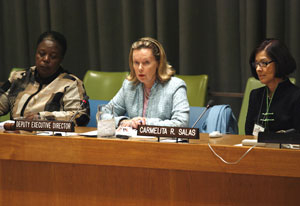News
Calling Attention to the Silent Tragedy of Maternal Death: The Rafael Salas Memorial Lecture 2007
- 28 November 2007
News
NEW YORK — “The sad thing is that, we know what needs to be done. We just need to do it, and do it fast and more effectively,” said Gertrude I. Mongella, President of the Pan-African Parliament. As guest speaker for the eleventh annual Rafael M. Salas Memorial Lecture on 20 November, Ms. Mongella emphasized the pressing need to invest in maternal health initiatives in Africa if the Millennium Development Goals are to be achieved.

“When will the news of thousands of women dying daily deserve the flying of flags at half mast?” she asked. “How long should maternal death remain a silent tragedy and a 'normal' everyday occurrence left to the family and friends to mourn?”
Ms. Mongella opened the lecture by paying tribute to Rafael Salas, UNFPA’s first Executive Director, in whose honour the lecture series was established. The series, which is held annually, provides a forum for distinguished guests to discuss various aspects of population and development. Past lecturers have included Prince Philip, Robert S. McNamara, Captain Jacque Cousteau, Fidel V. Ramos, Dr. Nafis Sadik, and Saburo Okita, among others.
"When will the news of thousands of women dying daily deserve the flying of flags at half mast?"
--Guest lecturer Gertrude I. Mongella
The focus of this year’s lecture on maternal health built on UNFPA’s strong commitment to safe motherhood initiatives and reducing maternal death. Ms. Mongella, who serves as the World Health Organization’s Goodwill Ambassador for Maternal and Newborn Health in the Africa region, discussed the pervasive problem that continent, in particular, has with providing effective health-care services to women.
“Women in Africa continue to die needlessly—although the five major obstetric causes of maternal mortality are well known, the interventions required to combat the morbidities and mortalities associated maternal health are still far below the desired standards,” she said.
Ms. Mongella noted the relationship between maternal health and economic development, highlighting the vital contribution that women play in society as mothers, caregivers and as active members of their communities. She further established a link between maternal health and each of the eight Millennium Development Goals, pointing out that neglecting maternal health in favour of other adversities, such as HIV, will hinder the successful eradication of disease, poverty, and basic human rights.
“Sometimes one wonders how quickly resources are mobilized towards solving calamities such as the bird flu, and mad cow disease, and we fail to use the same energy and speed to mobilize resources to save the many lives of women,” she said.
In closing, Ms. Mongella identified three critical focus areas that she believes will strengthen our efforts in the realm of maternal health: advocacy, networking and partnership building. In this regard she stressed the importance of accessible advocacy forums, networking as a learning tool, and forging strong partnerships with NGOs and governments. “I strongly believe that we can all be part of creating this new Africa,” she said.
Read the full speech.
— Anusha Alikhan